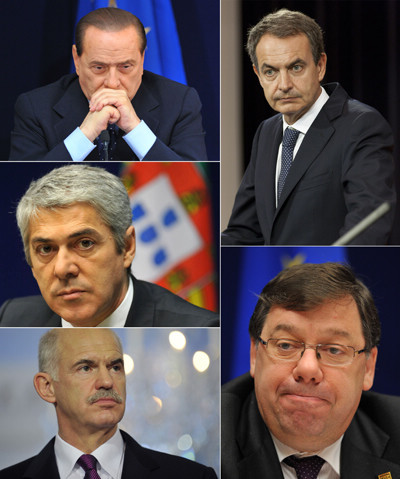|
 |
|
EX-PRIME MINISTERS: Clockwise from top left: Italy's Silvio Berlusconi, Spain's Jose Luis Rodriguez Zapatero, Ireland's Brian Cowen, Greece's George Papandreou and Portugal's Jose Socrates (XINHUA) |
China and Europe have established a comprehensive strategic partnership. As a strategic partner of the EU, China is obliged to provide assistance to European countries mired in the debt crisis. It is not because China is a "Good Samaritan," but because it values friendship with Europe, that China decided to purchase government bonds of Greece and other European nations. Moreover, China can diversify its foreign exchange holdings by purchasing European government bonds.
Some, like Reuters columnist John Foley, insist that since China wants the EU to recognize China's market economy status in exchange for assistance, its rescue could become "a friendly blackmail of the EU." Foley said in an article that Chinese Premier Wen Jiabao's speech at the World Economic Forum's Annual Meeting of the New Champions in Dalian, northeast China's Liaoning Province, on September 14 "was unusually blunt about what he expects in return: to be named by Europe as a market economy." "That would cost Europe little—but that doesn't mean it should agree," he said.
Offering assistance to European nations and the EU accepting China's market economy status are unrelated. Foley totally misunderstood Premier Wen's speech. China will never loot a burning house, nor will it turn away a dying man.
China is not the answer to Europe's crisis, neither will it turn its back on Europe. It is also ridiculous to say China's assistance to the EU is "friendly blackmail."
To "save" means to help others out of trouble, or to prevent a bad situation from deteriorating. There can be two ways for China to save indebted European nations. One is to pull them out of the debt crisis and help them resume economic growth. The other is to provide assistance to keep them from sinking deeper. Considering the current situation, the first way clearly is naive, while the second one seems more rational.
Apart from purchasing the government bonds of European nations, China can take other measures to help Europe. For example, it can import more European goods and services to increase these countries' export revenue. China can also inject more capital to the International Monetary Fund (IMF) so that the IMF can have more financial resources to bail out debt-ridden nations. Moreover, it can enlarge direct investment to Europe. Greece, Ireland, Italy and Spain have all designed privatization plans to cut fiscal deficits, presenting opportunities for Chinese investors.
China's good intentions, however, are not always welcomed in Europe. In November, Icelandic authorities rejected a Chinese businessman's plan to build a tourist resort in Iceland. European critics believed his investment could let China get a strategic foothold in the North Atlantic. China was thinking about "buying up the world," said Icelandic Interior Minister Ogmundur Jonasson.
An article in The Economist in June pointed out that China's investment makes Europeans nervous because they feel that China intends to buy Europe's jewels with its giant savings at knock-down prices.
In July, the European Council on Foreign Relations criticized enlarged investment to Europe from emerging market economies, including China, in a report titled The Scramble for Europe.
Confidence is extremely important when facing a crisis. President Hu Jintao said China believes the EU has the ability and wisdom to conquer current difficulties. Premier Wen also said China is willing to help Europe cope with its debt crisis. Chinese leaders' attitudes undoubtedly will bolster Europeans' confidence to overcome the crisis.
The author is deputy director of the Institute of European Studies at the Chinese Academy of Social Sciences | 